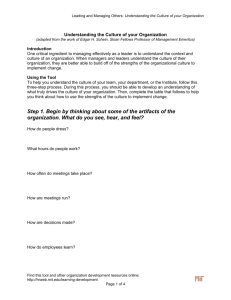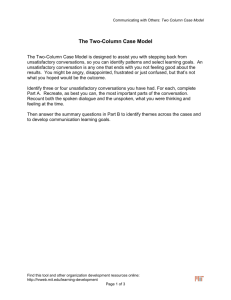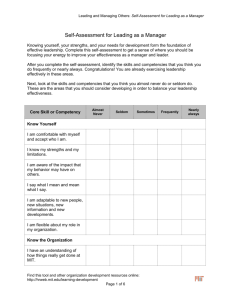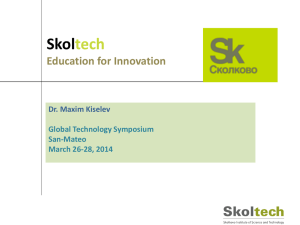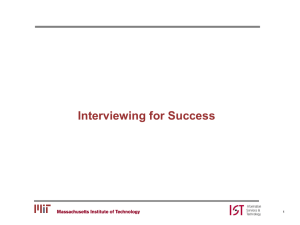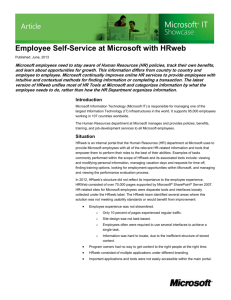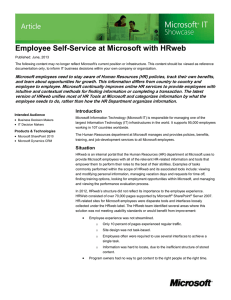Team Effectiveness Survey
advertisement
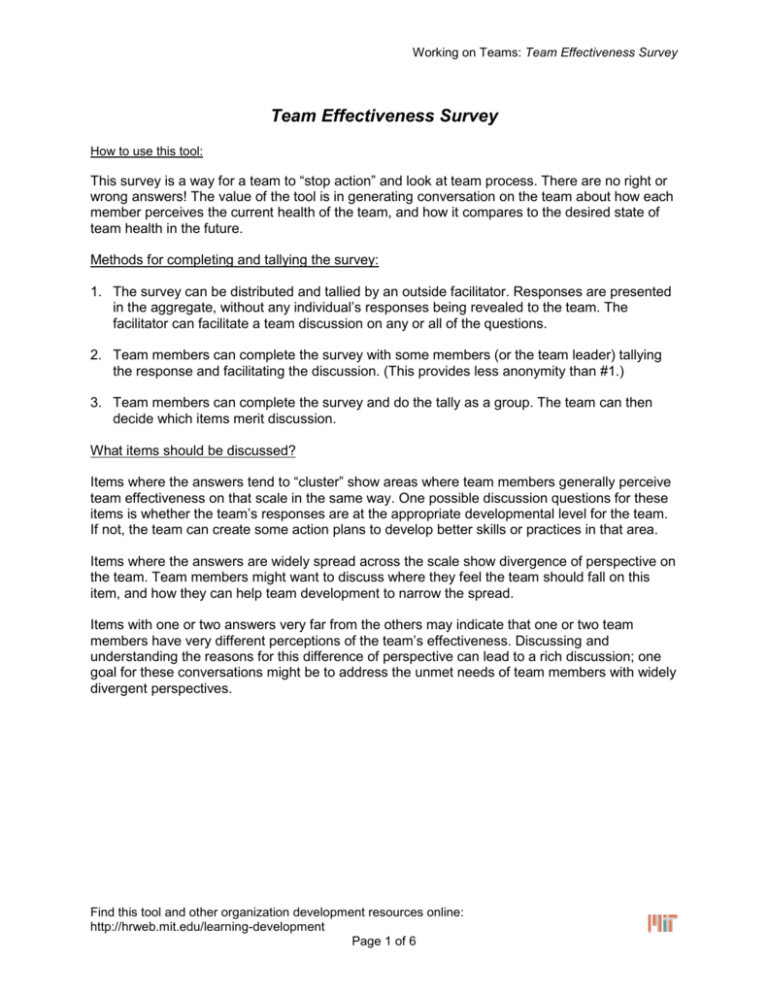
Working on Teams: Team Effectiveness Survey Team Effectiveness Survey How to use this tool: This survey is a way for a team to “stop action” and look at team process. There are no right or wrong answers! The value of the tool is in generating conversation on the team about how each member perceives the current health of the team, and how it compares to the desired state of team health in the future. Methods for completing and tallying the survey: 1. The survey can be distributed and tallied by an outside facilitator. Responses are presented in the aggregate, without any individual’s responses being revealed to the team. The facilitator can facilitate a team discussion on any or all of the questions. 2. Team members can complete the survey with some members (or the team leader) tallying the response and facilitating the discussion. (This provides less anonymity than #1.) 3. Team members can complete the survey and do the tally as a group. The team can then decide which items merit discussion. What items should be discussed? Items where the answers tend to “cluster” show areas where team members generally perceive team effectiveness on that scale in the same way. One possible discussion questions for these items is whether the team’s responses are at the appropriate developmental level for the team. If not, the team can create some action plans to develop better skills or practices in that area. Items where the answers are widely spread across the scale show divergence of perspective on the team. Team members might want to discuss where they feel the team should fall on this item, and how they can help team development to narrow the spread. Items with one or two answers very far from the others may indicate that one or two team members have very different perceptions of the team’s effectiveness. Discussing and understanding the reasons for this difference of perspective can lead to a rich discussion; one goal for these conversations might be to address the unmet needs of team members with widely divergent perspectives. Find this tool and other organization development resources online: http://hrweb.mit.edu/learning-development Page 1 of 6 Working on Teams: Team Effectiveness Survey Team Effectiveness Survey 1. Team Goals Team members lack a common understanding of the team’s goals. 1 2 Team members understand and agree on team goals 3 4 5 Comments: _______________________________________________________________________ _________________________________________________________________________________ _________________________________________________________________________________ 2. Member Contributions Team members contributions (information or ideas) are fully recognized and utilized. Team members contributions (information or ideas) are not recognized and/or utilized. 1 2 3 4 5 Comments: _______________________________________________________________________ _________________________________________________________________________________ _________________________________________________________________________________ 3. Procedures There are effective procedures to guide team functioning. There is a lack of procedures to guide team functioning. 1 2 3 4 5 Comments: _______________________________________________________________________ _________________________________________________________________________________ _________________________________________________________________________________ Find this tool and other organization development resources online: http://hrweb.mit.edu/learning-development Page 2 of 6 Working on Teams: Team Effectiveness Survey 4. Experimentation/Creativity The team experiments with different ways of doing things and is creative in its approach. The team is rigid and does not experiment with how things are done. 1 2 3 4 5 Comments: _______________________________________________________________________ _________________________________________________________________________________ _________________________________________________________________________________ 5. Evaluation The team often evaluates its process and productivity. The team never evaluates its process or productivity. 1 2 3 4 5 Comments: _______________________________________________________________________ _________________________________________________________________________________ _________________________________________________________________________________ 6. Decision Making The team has clear agreements about how decisions will be made. The team has not agreed about how decisions will be made. 1 2 3 4 5 Comments: _______________________________________________________________________ _________________________________________________________________________________ _________________________________________________________________________________ Find this tool and other organization development resources online: http://hrweb.mit.edu/learning-development Page 3 of 6 Working on Teams: Team Effectiveness Survey 7. Collaboration Team members share their experience and expertise in ways that enhance team productivity and development. Team members keep information and knowledge to themselves. 1 2 3 4 5 Comments: __________________________________________________________________ ____________________________________________________________________________ ____________________________________________________________________________ 8. Styles Differences in style are valued and used to the benefit of the team. Differences in style are not valued. 1 2 3 4 5 Comments: __________________________________________________________________ ____________________________________________________________________________ ____________________________________________________________________________ 9. Responsibilities There are clear agreements on roles and responsibilities. There is a lack of agreement on roles and responsibilities. 1 2 3 4 5 Comments: __________________________________________________________________ ____________________________________________________________________________ ____________________________________________________________________________ Find this tool and other organization development resources online: http://hrweb.mit.edu/learning-development Page 4 of 6 Working on Teams: Team Effectiveness Survey 10. Ability to Work Through Issues We work constructively on issues until they are resolved. It is difficult to work through or resolve issues. 1 2 3 4 5 Comments: __________________________________________________________________ ____________________________________________________________________________ ____________________________________________________________________________ 11. Respect I feel valued as an individual member in this group. People treat all individuals with respect. There is little value given to people's input. Some individuals are not treated with respect. 1 2 3 4 5 Comments: __________________________________________________________________ ____________________________________________________________________________ ____________________________________________________________________________ 12. Interpersonal Communications Communication between members is open and participative at meetings. Communication between members is closed and guarded at meetings. 1 2 3 4 5 Comments: __________________________________________________________________ ____________________________________________________________________________ ____________________________________________________________________________ Find this tool and other organization development resources online: http://hrweb.mit.edu/learning-development Page 5 of 6 Working on Teams: Team Effectiveness Survey 13. Meeting Process Meetings are well facilitated and focused. Meetings are not well facilitated or focused. 1 2 3 4 5 Comments: __________________________________________________________________ ____________________________________________________________________________ ____________________________________________________________________________ 14. Meeting Outcomes Meetings are productive and result in clear outcomes with agreements summarized. Meetings aren't productive. Outcomes are not clear so there are few agreements. 1 2 3 4 5 Comments: __________________________________________________________________ ____________________________________________________________________________ ____________________________________________________________________________ Based on “The Team Effectiveness Critique” by Mark Alexander. Adapted from The 1985 Annual: Developing Human Resources, edited by L.D. Goodstein and J.W. Pfeiffer, 1985, San Diego, CA: University Associates. Find this tool and other organization development resources online: http://hrweb.mit.edu/learning-development Page 6 of 6
